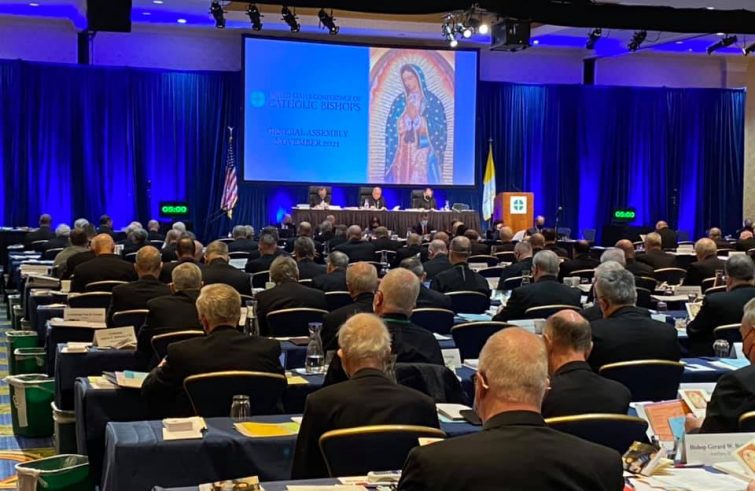
The United States Conference of Catholic Bishops’ first in-person meeting since November 2019 was held in Baltimore last week. A much-awaited meeting, after one had been called off and two others were held online. Yet the challenges facing the United States and the world were not on the four-day agenda. The Cop26 in Glasgow on global warming was not mentioned, nor was climate change. Racism was only hinted at in the opening remarks of the Conference president, the Archbishop of Los Angeles Msgr. José Maria Gomez.
Critical issues such as the dramatic drop in the number of priestly and religious vocations or the decline in the number of faithful attending Sunday Mass as a result of the pandemic remained untouched. Instead, the discussion on the document on the revitalisation of the Eucharist, intended to re-educate U.S. Catholics to a greater understanding of the mystery of the Eucharist over a three-year period, was given a central role, which will culminate in a National Eucharistic Congress in the summer of 2024 in Indianapolis, Indiana. The document was eagerly awaited by the press, which has been following the recent debate within the episcopate on whether politicians who support abortion rights should receive the Eucharist. This issue also involved Joe Biden, the second Catholic president in the history of the United States.
The document approved on Wednesday does not address the question of whether politicians or other public figures have the right to receive the Eucharist. Instead, it offers a detailed analysis of its theological and spiritual dimensions, citing the Pope, St. Augustine and Catholic activist Dorothy Day.
The 29-page document barely mentions the term abortion. The opportunity for a bishops’ vote on “the matter of communion eligibility” for politicians was strongly discouraged by Archbishop Christophe Pierre, Apostolic Nuncio to the United States “There is the temptation to treat the Eucharist as something to be offered to the privileged few”, the nuncio said, echoing the Pope’s dictum that the sacrament is not a “prize for the perfect.”
At the press conference on the first day, Archbishop Gomez explained: “My understanding is that the intention of the document since the beginning was about educating Catholics about the real presence of Jesus in the Eucharist.” The chairman of the Bishops’ pro-life committee, Archbishop Joseph Naumann of Kansas, commented otherwise: “I’m not sure that we’ve taken it seriously as bishops, our responsibility for the care of the souls of these politicians… “If the Catholics in Congress, members of Congress, supported the church’s teaching, we would have had bipartisan supermajorities.”
Msgr. Andrew Cozzens, Bishop of Crookston, outlined the various avenues wherein the bishops will promote the “Eucharistic revival” and announced the creation of a website and a “national advertising strategy” funded by the Knights of Columbus, along with “professionally produced catechetical resources.” The bishop proposed the creation of a fundraising organisation, since campaigns such as the organisation of the Eucharistic Congress would require $28 million.
The bishops of the United States then set a date for the liturgical feast of St. Teresa of Calcutta. The date is Sept. 5, the date on which she died in 1997. The feast is already marked with solemnity in the chapels of the Sisters of Mother Teresa throughout 30 US dioceses where they are present.
The Bishops approved Updated Socially Responsible Investment Guidelines and authorised the Committee on the Protection of Children and Young People to begin a review of the Charter for the Protection of Children and Young Adults before June 2025.
In his opening speech, Archbishop Gomez addressed the question of how the Church could reach out to an increasingly secular society. He told the bishops that American society was “losing its story”, a story “rooted in a biblical worldview and the values of our Judeo-Christian heritage.” The archbishop went on to explain: “this narrative may be breaking down. This is one of the consequences of living in a secular society.” Gomez thus quoted from the turn-of-the-twentieth century Archbishop John Ireland as a role model in proclaiming Jesus Christ within the changing circumstances of civil society. The “contemporary challenge of the Church in America”, he said, “is how to carry out her mission.” His speech was received with a standing ovation.











